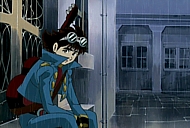
Android Kikaider Vol. 1
I'm getting sick of Pinocchio. The core story still holds merit, of course; the journey from being something false to something true, from toy to boy or machine to man, holds all sorts of theological and metaphysical implications. But the tale's so over-told, at this point, that it's better not to tell it at all than to tell it badly. And in my opinion, Android Kikaider is one of the stalest versions we've seen in recent years. It's a remake of a live-action show from the '70s, and despite the few things it gets right, I think it would have been better off to just have nostalgic memories of the original. Although I saw just the first volume, it's so by-the-numbers that I lost all interest in where the series could head from here.
Dr. Komyoji has fashioned Jiro as his ultimate creation. Jiro's designed to protect his daughter Mitsuko and his young son Masaru, and in truth, they'll need it. For Komyoji's dastardly rival, Professor Gill, has designed a small army of robotic warriors for world conquest, and he's determined to destroy Komyoji and his latest machine than to let them stop his plans. After Komyoji's lab is destroyed, Jiro is free to explore the world, but he's got some serious problems. He's suffering from amnesia, which is symptomatic of issues with his whole wiring. Deep inside of him is a circuit that controls his ethical side, and it may very well fail...and if it does, he could unleash terror. Because, of course, he's not just Jiro - he can transform into Kikaider, a robotic weapon of astonishing power, when necessary. Mitsuko realizes the problems of his programming and wants him destroyed, but not because she hates him...but because he symbolizes to her the father who was too involved in his crazy experiments to really care for her. It's hard to be a robot alone in the world when both friend and enemy alike want to see you put down...
The first volume of Android Kikaider is both beautiful and frustrating. The artwork itself is often lovely to admire, and the color schema is just unique enough to be interesting to a seasoned anime watcher. But it's hard to call this animation at all. With lots of still pans, it started to feel like a painting display on DVD rather than an actual program. I do applaud the use of music in the show, which really saves it on occasion. It's a melancholy soundtrack, but it underlines the themes perfectly, and I daresay that it's what makes the show watchable at all. Seeing that Jiro's lone accessory is a guitar he carries on his back, I suppose that the music works is fitting.
But beyond the music and the artwork, I really don't have much good to say about this title. Kikaider's creators mistake pathos and angst for drama. There's nothing all that interesting about this account of an all-but-abandoned robot, but making him more depressive than Woody Allen on lithium doesn't help any. The whole story is under the same moody haze. Though I was somewhat interested in the character of Mitsuko and her relationship with her father, her actions really weren't justifiable by anything we saw on screen. Everybody in this show is in serious need of Prozac.
And when it's not sad, it's silly, as Professor Gill is the dorkiest, stereotypical heavy they could possibly have pulled out of the villain closet. He belongs in a different anime. Then we reach the battles, which are as exciting as a root canal. Every fight, we get the same transformation sequence into Kikaider, and it isn't even interesting the first time it happens. And it's not just that we know that Jiro is going to win, it's that Gill's other mechanized baddies are plain dumb. Boring, boring, boring.
I've already traded this title away on Peerflix, and I don't have an ounce of regret about it...except perhaps for the poor fellow who watches it after me. Though I admit the artists working on this piece have some talent in the visual department, for a show about the heart of a machine wanting to become more, it's pretty soulless. If you turn to modern interpretations of Osamu Tezuka's work, whether the superb Metropolis or the lesser but still representative Astro Boy, you'll find the same themes treated on a much finer level.
Android Kikaider Vol. 1 -- violence -- C-

